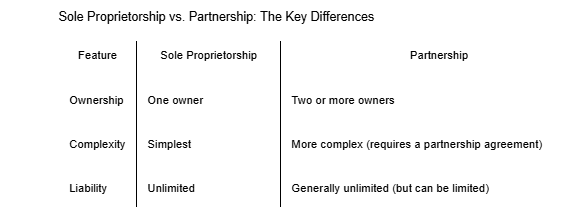Sole Proprietorship vs. Partnership: Which Business Structure is Right for You?
Starting a business
BUILDING A BRANDBUSINESS TIPSBUSINESS RESOURCES
2/8/20252 min read


Starting a business? One of your first decisions is choosing a business structure. The simplest options are sole proprietorships (one owner) and partnerships (two or more). This guide breaks down the differences to help you decide what's best for your business.
Sole Proprietorship: The One-Person Show
What it is: A business owned and run by one person. You keep all the profits but are personally responsible for all debts. "You are the business."
Pros: Easy to start, simple taxes (profits taxed as your personal income).
Cons: Unlimited personal liability (your assets are at risk).
Best for: Low-risk, service-based businesses (e.g., freelance writer, gardener).
Types:
Self-Employed: Doing a trade or service.
Freelancer: Providing services to other businesses.
Franchise: Running a franchise.
Partnership: Joining Forces
What it is: A business owned by two or more people who share profits, losses, and responsibilities.
Pros: Shared resources, skills, and workload; easier to raise money.
Cons: Shared liability; disagreements can arise.
Best for: Businesses where shared expertise and resources are valuable.
Types:
General Partnership: All partners share profits, losses, and liabilities equally.
Joint Venture: Partnership for a specific project.
Limited Partnership (LP): Some partners have limited liability and less involvement.
Limited Liability Partnership (LLP): Partners have some protection from each other's mistakes.
Limited Liability Limited Partnership (LLLP): General partners have personal asset protection.
Which Should You Choose?
Choose Sole Proprietorship if:
You're working alone.
You want simple setup and taxes.
Your business is low-risk.
Choose Partnership if:
You want to share resources and workload.
You need diverse expertise.
You're comfortable sharing control and liability.
FAQ
Are partnerships taxed like sole proprietorships? Yes, both pass profits through to the owners to be taxed as personal income.
What are the 5 types of partnerships? General, joint venture, limited, limited liability, limited liability limited.
What business is best for a sole proprietorship? Low-cost service businesses like freelance writing or design.
Conclusion:
Choosing the right business structure is important. Consider your needs, risks, and long-term goals. Get advice from a lawyer or accountant to make the best choice for your situation.
Disclaimer: Consult legal professionals for real advice.




Build a Brand Co.
Build A Brand Co.© 2025. All rights reserved.
Get your weekly business tips, inspiration, free templates & more into your inbox
